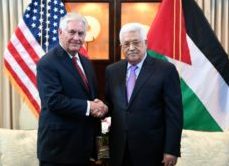
Will peace process delay or block Jerusalem embassy move? U.S. Secretary of State Tillerson with Palestinian President Abbas. Illustrative. Photo Courtesy of U.S. State Department
After making a definitive-sounding promise to move the United States Embassy to Israel from Tel Aviv to the Israeli capital of Jerusalem, U.S. President Donald Trump is now sounding cautious and putting such a move into the context of a potential Israel-Palestinian peace process. U.S. Secretary of State Rex Tillerson, speaking on NBC’s Meet the Press, told host Chuck Todd that Trump “has recently expressed his view that he wants to put a lot of effort into seeing if we cannot advance a peace initiative between Israel and Palestine, and so I think in large measure the President is being very careful to understand how such a decision [on the embassy] would impact a peace process.”
Tillerson also noted that Trump’s decision would be “informed again by the parties that are involved in those talks and most certainly Israel’s view, on whether Israel views it as being helpful to a peace initiative or perhaps a distraction.” Israel responded to Tillerson’s comments, which aired on Sunday, within hours: They still want the move. And it will benefit the peace process.
Israeli Prime Minister Benjamin Netanyahu said that not only would moving the embassy to Jerusalem “not harm the peace process,” he noted that “on the contrary, it would advance it by correcting an historical injustice and by shattering the Palestinian fantasy that Jerusalem is not the capital of Israel.” Netanyahu, in comments released by his office, noted that this Israeli position on having the U.S. embassy in Jerusalem has been “stated many times to the American administration and to the world.”
The comments come less than two weeks before Israel celebrates the 50th anniversary of their retaking of the Biblical city of Jerusalem, which reunited the capital under Israeli sovereignty. While Jerusalem has been considered the capital of Israel for millennia—even during Israel’s long exile—the Palestinians claim the eastern section of the city, which includes the ancient City of David and the Temple Mount.
With Jerusalem’s sensitive status considered one of the core and most controversial issues in any Israel-Palestinian peace process, the U.S. has chosen not to place their embassy in the Israeli capital—which contrasts with their approach in other nations—despite the expectation that Israel would retain their capital in at least part of Jerusalem in any peace deal.
Almost four months into Trump’s presidency, Tillerson provided some insight into why the proposed embassy move is still under review.
“Well the President, I think rightly, has taken a very deliberative approach to understanding the issue itself, listening to input from all interested parties in the region and understanding what such a move, in the context of a peace initiative, what impact would such a move have,” said Tillerson in the interview, which was posted to the NBC News website.
Tillerson, as the top U.S. diplomat, plays a key role in how the U.S. interacts with the rest of the world. He not only spoke of Trump’s process in the interview, he also agreed with the caution. Said Tillerson of Trump’s approach, “I think he is being very measured in how he goes about this and appropriately so.”
(By Joshua Spurlock, www.themideastupdate.com, May 14, 2017)
